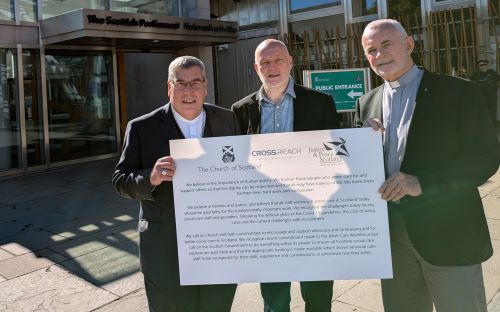Taking the Fair Pay For Carers Campaign to Parliament
Categories: Articles:Social Justice |
Published: 27/09/2024 |
Views: 227

Faith leaders have held constructive talks with the Scottish Government over improving pay for social care workers.
 Representatives of the Catholic Church and Church of Scotland met with Neil Gray MSP, Cabinet Secretary for Health and Social Care, at the Scottish Parliament recently to discuss pressures facing the sector in the face of the ongoing cost of living crisis.
Representatives of the Catholic Church and Church of Scotland met with Neil Gray MSP, Cabinet Secretary for Health and Social Care, at the Scottish Parliament recently to discuss pressures facing the sector in the face of the ongoing cost of living crisis.
Father David Stewart, clergy representative on the national commission of Justice and Peace Scotland and Rt Rev Dr Shaw Paterson, Moderator of the General Assembly articulated the collective concerns of around 400 faith leader representatives from across Scotland, who supported the ‘4 steps to Fair Work’ campaign.
Spearheaded by the Coalition of Care and Support Providers in Scotland, which represents over 220,000 people and their families, the campaign aimed to address Fair Work concerns within the not-for-profit social care sector.
Faith communities say it is well documented that salaries for the largely female workforce have fallen, in real terms, since December 2021 and ensuring they are paid in line with public sector social care staff and the equivalent grades in the NHS is a matter of justice and equity.
They have called on the Scottish Government to reconsider its current pay policy and approve at least a 10% wage differential on top of the Living Wage for frontline workers while the longer-term ambitions for sectoral bargaining under the National Care Service (NCS) are being agreed. The faith leaders also asked that any future NCS made the Living Wage the baseline for all employees in the sector.
The current issues with recruitment across the sector impacts on people accessing social care services, who are now struggling to access the types of person-centred support necessary for them to live a full and fulfilling life.
It affects people in every community in Scotland and it is out of a concern for those living in the most vulnerable situations which motivates the actions of faith leaders. Speaking after the meeting, Father David Stewart said: “I came away from our meeting encouraged that the Cabinet Secretary sees the importance of engaging and listening to the faith communities, and encouraged that the government seems to recognise the requirement of taking action in this domain to create a more caring society in Scotland.
“Placing the proper value on those who provide care is crucial to demonstrating that we value those for whom they provide care and not see them as a problem to be solved. And we ask that those in power appreciate the role of faith communities when they deliver around a quarter of social care provision.”
These sentiments were echoed by the Moderator, who said: “We are enthused by the positive reception from the Cabinet Secretary for Health and Social Care in response to the issues we raised around care provision and renumeration in the sector. His openness to our discussions and our asks, even as he set out the realities of the situation from his viewpoint, provides hope that we, along with other sector representatives, can engage in further productive dialogue to initiate necessary improvements.”
The Moderator was supported by representatives from CrossReach, the operating name of the Church of Scotland's Social Care Council, which is a leading and well-respected provider of social care for over 28,000 people of all ages in Scotland. Established 150 years ago, it runs 70 locations across the nation and employs about 1,600 staff and has around 350 volunteers.
Commissioners at the General Assembly in May this year backed a deliverance that “expresses alarm about the cuts” to social care services being experienced by CrossReach and other care providers. It instructed CrossReach and the Faith Action Programme Leadership Team to raise awareness about the crisis in social care with presbyteries and congregations and to “make representations to the Scottish Parliament and Scottish Government.”
The faith leaders made it clear to Mr Gray that everyone who backed the ‘4 steps to Fair Work’ campaign understand that the social care system is under pressure but that urgent steps must be taken to change a system that is failing to deliver the necessary quantity and quality of person-centred care needed to support people across the nation
They added that they appreciate that there are no easy answers but stressed that they do not have a vested interest in this issue but are simply interested in social justice, dignity in care, and living well in a fair society.
The faith leaders said the system is currently putting pressure on the NHS by keeping people in hospital for longer than they need to be and patients are being admitted when investment in preventative support measures could keep them in a community setting.
They made clear their desire to understand the Scottish Government’s position so that faith communities can be a constructive voice for change and advocate for resources.
Return to previous page